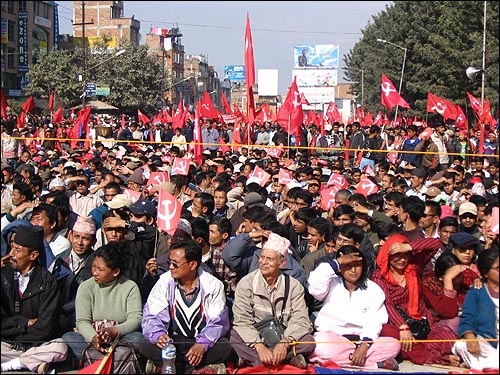 Hey Everyone...A New post, educating fellow comrades about a struggle that needs to be waged. One I think is particularly important. The opposition against H.R. 4437 is a Class Struggle, not just about Immigrants, but about all Proletarian people...documented and undocumented. Learn more about this comrades, at www.nmass.org. Repeal IRCA!! Fight for ALL Working People!
Hey Everyone...A New post, educating fellow comrades about a struggle that needs to be waged. One I think is particularly important. The opposition against H.R. 4437 is a Class Struggle, not just about Immigrants, but about all Proletarian people...documented and undocumented. Learn more about this comrades, at www.nmass.org. Repeal IRCA!! Fight for ALL Working People!WHAT IS "EMPLOYER SANCTIONS"?
“Employer Sanctions” is a misnomer
Signed into law by President Reagan, employer sanctions was supposedly enacted to protect jobs for U.S. citizens by punishing employers with a fine for “knowingly” hiring undocumented workers. Contrary to its name, however, few employers are actually “sanctioned” under the law. In 2004, for example, the government issued to employers a total of only three “notices of intent to fine.” The limited number of enforcement actions against employers since 1986 is no accident; there are strong political and economic interests that favor expanding the supply of cheap labor.
Consequently, it is not the employers that are punished by the law, but working people in this country. The government gives e mployers a ‘hoodwink and a nod' to hire undocumented workers, authorizing them to wield unchecked power and to use immigration status to legally exploit workers. By denying undocumented workers the right to make a living, our government creates an underclass of laborers who are criminalized and forces them to accept the most undesirable, inhumane working conditions. To compete with undocumented workers, native-born Americans and documented workers must then lower their standards or else be replaced by cheaper labor, fueling a cycle of resentment and hostility among working people.
The Real Purpose
The purported intent of employer sanctions was to deter illegal immigration and to protect American jobs by targeting the demand for undocumented workers. Yet, government, community groups, labor unions, and scholars recognize that employer sanctions has accomplished neither goal.
Employer Sanctions:
DID NOT PROTECT: It made the undocumented workforce even more attractive by stripping away their rights to demand fair conditions and forcing U.S. citizens and documented workers to compete with them in a race-to-the-bottom.
DID NOT DETER: It actually increased the demand for a vulnerable group of workers and invigorated employer demand for cheap labor. Today there is an estimated 11 million undocumented immigrants in the U.S. , a dramatic increase from the estimated 4 million present when IRCA was enacted. In the 1990s, there was a net annual increase of approximately 500,000 persons.
THE IMMIGRATION DEBATE
With so many proposals for immigration reform on the table, many questions arise on what a true immigration reform should be. We address some of the common questions below.
Will the repeal of employer sanctions mean more undocumented immigrants coming to the U.S. ?
In its quest to remain competitive, the U.S. government along with business interests must maintain an economy wholly dependent on the exploitation of undocumented and documented workers. They ultimately desire more undocumented workers, not less. While there are other factors that influence why immigrants come to the U.S. , the government-created “pull factor”of employer sanctions proves to be a powerful force in channeling more undocumented workers to this country. Employer sanctions, by criminalizing undocumented workers, has created an environment whereby undocumented workers are favored by unscrupulous employers and can easily gain employment as exploited labor. This has led to the expansion of the underground economy, making the labor law unenforceable. Law abiding employers who compete with unscrupulous employers must also lower their standards and conditions. Meanwhile, undocumented immigrants are uprooted from their native countries, separating families and diminishing the chances for communities to come together to change conditions in their native country.
Repealing employer sanctions means 1) workers will no longer easily be pitted against one another to compete for jobs and will have greater opportunities to organize, which will lead to 2) greater enforcement of not only labor but other laws as people come out of the shadows, and 3) the destruction of the foundation that all regressive anti-immigrant measures rest on. All of these changes will seriously weaken the incentives created by the government when it enacted employer sanctions. Employers will no longer have the same insatiable desire to seek out undocumented workers because they will no longer be as vulnerable.
Why won't putting more resources into strengthening enforcement against employers result in better wages and job conditions?
Some argue that strengthening penalties against employers and setting up a better system for verifying a workers work authorization would solve the problem. This position is flawed at its core. The call to reinforce employer sanctions is really just a ruse that, as the last twenty years since IRCA have shown, will be used to push undocumented workers further underground and continue to downgrade the conditions of both immigrant and citizen workers. The government will continue its consent to the hiring of undocumented workers. Employers, too, will find other ploys to evade sanctions such as increasing their use of subcontracting.
Why aren't legalization or a temporary guestworkers program viable long-term solutions?
Not one immigration reform proposal currently being offered by the Administration or by Congress calls for the repeal of employer sanctions. In fact, many of the proposals, such as Sensenbrenner's Border Protection, Antiterrorism and Illegal Immigration Act (HR 4437) and Senators John McCain and Edward Kennedy's The Secure America and Orderly Immigration Act of 2005, call for the strengthening of employer sanctions and stepped up border control and enforcement. These measures will only widen the gap within and between the community and increase the coercive power of employers over their workforce.
From our history, we know that legalization programs are limited when they are not able to address the causes and effects of an increased undocumented population. Twenty years ago, when advocates traded employer sanctions for the amnesty provision of IRCA, the cost of legalizing 2.7 million immigrants meant in return the future criminalization of tens of millions more people who came after 1982. The Bush Administration proposal for “temporary guestworkers”, and other proposals like it, will become another limited legalization program that will keep workers in indentured servitude-like conditions.
How does Employer Sanctions impact us?
Repeal of employer sanctions affects us all no matter who we are
The criminalization of immigrant workers has hurt all workers and communities. Employer sanctions puts labor law in the hands of employers, not workers. As a consequence, employer sanctions becomes a versatile tool for employers to further exploit workers. Employers can readily invoke sanctions in order to pit workers against one another based on immigration status, retaliate against undocumented workers who stand up and crush any unified organizing efforts, and defend against their own law-breaking actions by arguing that undocumented workers have no rights because they are “illegal.”
For instance, i n New York an employer utilized employer sanctions to retaliate against a group of undocumented and documented Chinese restaurant workers when they began organizing together. In the aftermath of Hurricane Katrina, African-American workers and undocumented Latinos are being pitted against each other throughout the rebuilding efforts in the South, giving employers free reign to drive working conditions downward. Many workers in a range of industries see the mid- and late 80s as a demarcation for when working hours began to skyrocket while wages plummeted . With such a system in place, documented workers, too, have little room to refuse or to organize against unfair working conditions.
Employer sanctions is also the cornerstone of a series of regressive, anti-immigrant laws we are seeing today such as Hoffman-Plastics and Real ID Act on the federal level. It is also being used to justify new state laws that deny undocumented injured workers their owed compensation and medical benefits. In other parts of the country, particularly Arizona , employer sanctions constitutes the basis of the national trend to attack the rights of undocumented workers.
The repeal of employer sanctions will lead to greater labor protections for all working people and can actually raise our standards. It will diminish employer control over the workforce and counter the trend of regressive legislation. By decriminalizing undocumented immigrants and bringing this underclass from out of the shadows, the abolition of employer sanctions will also allow for greater security in our communities and lead to a safer, more just society for us all.
What are the effects of employer sanctions outside of the workplace?
By forcing an entire class of workers into the shadows of society, employer sanctions makes not only labor law but all laws unenforceable. It discourages people from openly exercising their civil liberties or coming forward to report crimes and illegal activities, threatening the security of us all.
 King Gyanendra has said that he would restore "democracy" in Nepal, and wants peacen in Nepal. It seems hallow, the Communist Party of Nepal (United Marxist-Leninists) [CPN (UML], one of the major parties in the Seven Party Aliance (SPA) has already rejected the kings offer on the basis that it leaves out the Communist Party of Nepal (Maoist) [CPN (M)] from the process, and it does not concern itself with the twelve point agreement made with the SPA and CPN (M). The Constituent Assembly seems to be the only thing the SPA wants, and this will mean the end of the Feudal Dictator, King Gyanendra. It will soon be the end of the King, and perhaps the Constituent Assembly wil
King Gyanendra has said that he would restore "democracy" in Nepal, and wants peacen in Nepal. It seems hallow, the Communist Party of Nepal (United Marxist-Leninists) [CPN (UML], one of the major parties in the Seven Party Aliance (SPA) has already rejected the kings offer on the basis that it leaves out the Communist Party of Nepal (Maoist) [CPN (M)] from the process, and it does not concern itself with the twelve point agreement made with the SPA and CPN (M). The Constituent Assembly seems to be the only thing the SPA wants, and this will mean the end of the Feudal Dictator, King Gyanendra. It will soon be the end of the King, and perhaps the Constituent Assembly wil l lead to a New Democratic State. Prachanda and Dr. Bhuttari (spelling?) have been leading a new break, I think what this is leading to...above all is national liberation and democratic soverignty of the people. And perhaps we will see a new Maoist state that will allow for multi-party democracy under the Dictatorship of the Proletariat. Maybe this is the new "People's Democratic Dictatorship" to quote Mao. It is hard to say, but what is indeed clear is that the SPA and CPN (M) on the basis of the 12 point agreement, is bound for victory.
l lead to a New Democratic State. Prachanda and Dr. Bhuttari (spelling?) have been leading a new break, I think what this is leading to...above all is national liberation and democratic soverignty of the people. And perhaps we will see a new Maoist state that will allow for multi-party democracy under the Dictatorship of the Proletariat. Maybe this is the new "People's Democratic Dictatorship" to quote Mao. It is hard to say, but what is indeed clear is that the SPA and CPN (M) on the basis of the 12 point agreement, is bound for victory.







